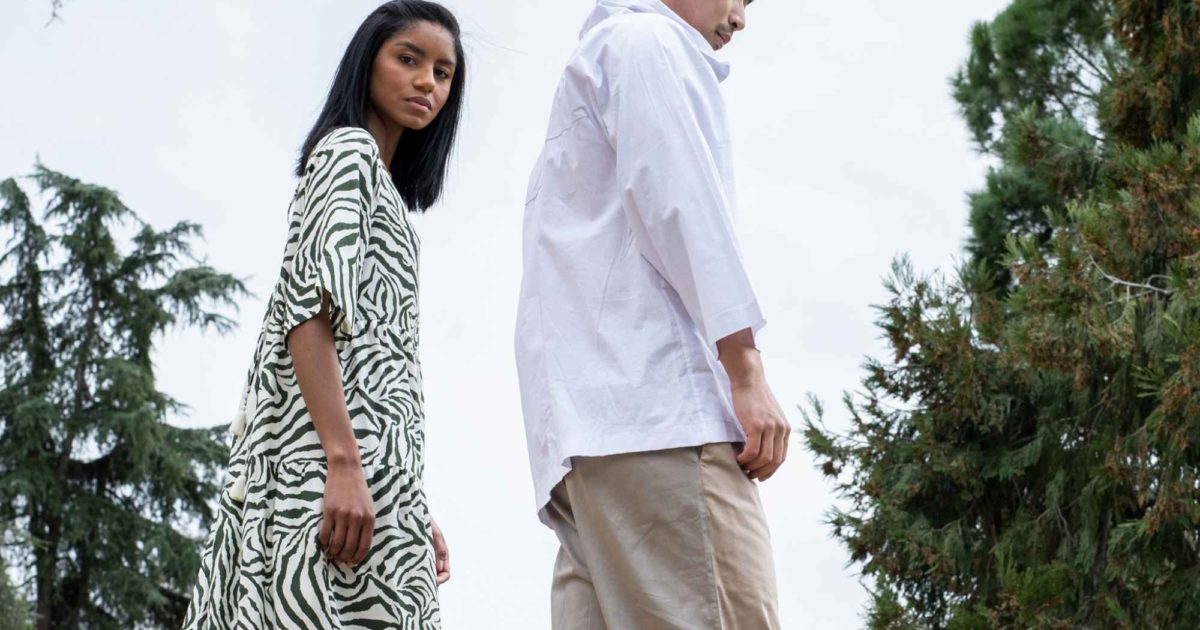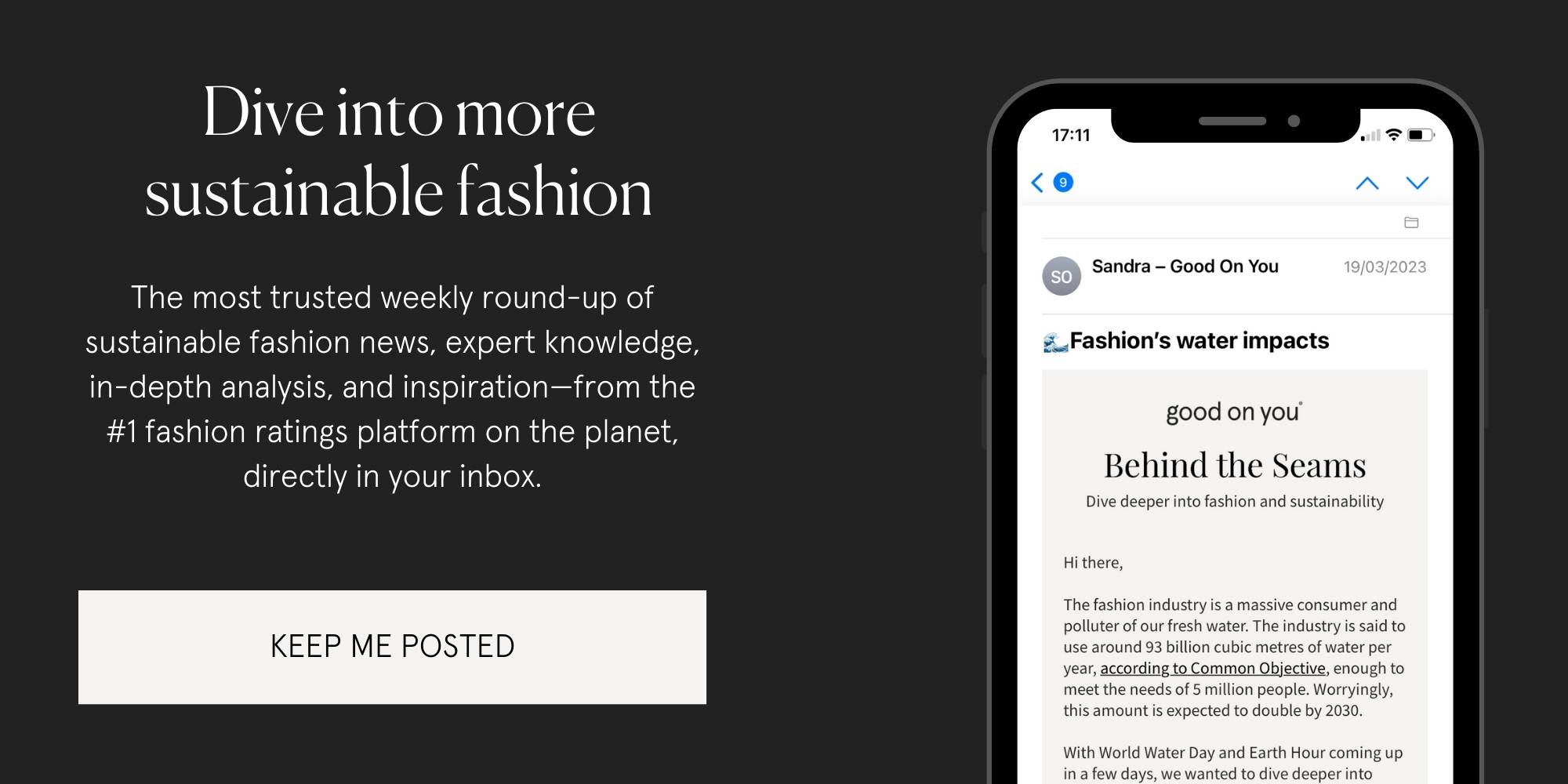Fashion
A Beginner’s Guide to More Sustainable Fashion – Good On You

Living more sustainably can feel complex, with so many issues to address and care about. Here, we’re sharing the basic knowledge and tools you need to start your more sustainable fashion journey and build a more conscious wardrobe confidently.
The beginner’s guide to more sustainable fashion
More people than ever are recognising the impacts humans have on the world, and as a result, a lot of us want to reduce our footprint. In fact, in 2021, a report from the Economist Intelligence Unit (EIU), commissioned by WWF, showed a 71% rise in searches for sustainable goods over the past five years.
For many, the sustainability journey starts at home in their wardrobe. Why? Sadly, the fashion industry is one of the most polluting industries in the world, impacting millions of people. Shoppers want to make better fashion choices. They want to do good, look good, and feel good.
But where to start? How do you know what’s good and what’s bad? And what do you do with that information?
Fear not, Good On You is here to help. Good On You is a fashion (and beauty) brand sustainability ratings platform—we’ve done the research and spoken to the experts, the campaigners, and the brands to develop our world-leading methodology and rate how fashion brands impact these three key areas: people, the planet, and animals. We score each brand on hundreds of issues within these areas and give an overall rating from “We Avoid” and “Not Good Enough”, through “It’s a Start”, to “Good” and “Great”. You can search your favourite brands on our directory or in the app.
Here, we’ve created an ultimate guide and index for all you need to know about building a more ethical wardrobe with confidence.
What is more ethical and sustainable fashion?
Let’s talk about what “ethical and sustainable fashion” means exactly.
Sustainable fashion builds on the concept of sustainable development, which the UN defined in 1987 as “development that meets the needs of the present without compromising the ability of future generations to meet their own needs”.
The intended meaning of the term sustainable fashion is often noble. When campaigners and experts use it (and related terms like ethical or eco fashion), they’re advocating for an industry that manages its environmental impacts within planetary boundaries and ensures the wellbeing of people and other animals throughout the supply chain. In this view, meaningful sustainability requires a fundamental shift away from the business models that drive overproduction, overconsumption, waste, worker exploitation, and the climate emergency. Many experts will use terms like degrowth and the circular economy to describe the systemic changes needed to achieve a more sustainable fashion industry.
But due to its vagueness and the perceived lack of progress towards these goals, sustainable fashion is a term that many designers, activists, and policymakers now have mixed feelings about.
And in recent years, terms like “sustainable” and “ethical” have been frequently co-opted in greenwashing and corporate sustainability spin. When the brands that are responsible for the majority of fashion’s overproduction, environmental impacts, and worker exploitation claim to be sustainable, the term begins to lose its meaning. And while a brand can be “more sustainable” and consumers can make “more sustainable choices”, the current reality is that no brand or choice is fully sustainable. This means the term is often limited and loses its potency.
To combat greenwashing, policymakers everywhere, from New York to the European Union, are working on legislating how a brand can use sustainability terms in their marketing, leading to a rise in alternative ways of describing the initial goals behind the term itself.
Ethical and sustainable fashion are often used interchangeably. For some, ethical fashion focuses more on the social impact of the fashion industry and what is “morally right”. Ethical fashion goes beyond your local labour laws and covers a wide range of issues such as living wages, working conditions, animal welfare, and vegan fashion. But ignoring the ethical dimensions of environmental challenges, like the impact of climate change or the destruction of freshwater sources, on humans and animals wouldn’t really make sense.
Learning more about sustainable fashion
The ethical and sustainable fashion terms you need to know
Whether you’re new to sustainable fashion or a veteran, the terminology can be confusing. We’ve created this comprehensive and easy-to-understand glossary to help you navigate the ethical fashion world with ease.
What is … ?
- Fast fashion: If you’ve got this far then you might already be aware of fast fashion’s dark side, but it’s worth exploring how the industry got to this point—and how we can help change it.
- Ultra fast fashion: Ultra fast fashion takes everything harmful about fast fashion and speeds it up. But that only starts to describe its dark side. In this exposé, we dive deep into TikTok #hauls, brands’ gross labour abuses, and creepy “surveillance capitalism”.
- Slow fashion: Slow fashion is an awareness and approach to fashion that considers the processes and resources required to make clothing. It advocates for buying better quality garments that will last longer, and valuing fair treatment of people, animals, and the planet.
- Vegan fashion: Even if you don’t call yourself vegan in everyday life, you may still be tempted by vegan or cruelty-free fashion. Why? Because it seems to win hands down over conventional fashion, in terms of several human, environmental, and of course, animal welfare impacts.
- Circular fashion: In this article, we dive deeper into what circular fashion is today, how it came to be, and what we can do to align with the concept in our consumer choices—not only concerning fashion but also in our lives more broadly.
How can you tell when a fashion brand is greenwashing?
Greenwashing exists in fashion and it’s not always easy to spot. As conscious consumers, we should recognise that there are no simple solutions to complex problems. So what are the telltale signs? How can you tell when a fashion brand is greenwashing? This guide will help you figure it out.
What are you wearing? The ultimate clothing material guide
We have done the detective work for you and written guides to many of the fabrics that you find on store shelves and in your wardrobe and compiled them here in our (hefty yet helpful) ultimate material guide.
Is more ethical and sustainable clothing really expensive?
We get it—for a lot of people, one look at the price tag on an item of responsibly made clothing is enough to turn you off for good, but we are here to tell you that it shouldn’t. There are very good reasons why those little numbers seem an awful lot bigger than they do at the chain retailers down the road.
Is locally made better?
We’ve all seen that little white label tucked away on the inside of our clothing: “Made in Australia”, “Made in Turkey”, “Made in Bangladesh”. But what do country of origin labels really mean? In this article, we discuss whether locally made clothing is more ethical. Read on to find out before your next shop.
The importance of transparency in the fashion industry
Transparency is an important aspect of sustainability, and it’s something we believe in wholeheartedly. It means being as open and honest as possible about what’s going on behind the scenes. Read this article to discover what transparency in the fashion industry looks like, why it’s essential, and perhaps most importantly, whether it’s enough.
Fashion traceability is confusing—here’s what you need to know
Traceability is another key factor in sustainable fashion, and understanding what it means will help you to hold brands accountable.
Why we should wear clothes until they’re worn out
Do you darn old socks? Take your shoes to the cobblers? Or put patches on your elbows and knees when they thin out? A Swedish study from 2017 suggests extending the life of our clothes is one of the best things we can do for the planet.
What on earth is a clothing supply chain?
Clothing supply chains often involve many different individuals at all production levels, making it difficult for companies to know where different parts of their products originate. Slow-fashion entrepreneur Ania Zoltkowski broke the process down, one step at a time, in this guide.
What is cultural sustainability, and why is it so important for fashion?
What does cultural sustainability mean in fashion? Good On You’s rating analyst Jessica Ouano speaks with Indigenous artisans, brands, and cultural sustainability experts to help you understand one of the most important topics in fashion that’s too often left out of sustainability conversations.

Doing the work
Check how your favourite fashion brands rate
Good On You gives you the power to make better fashion choices and help you find more sustainable brands that match your values and style. Discover our directory or download the app to check your favourite brands’ impact on the planet, people, and animals.
The 5 Rs of fashion: Reduce, rewear, recycle, repair, resell
While brands are at work looking at the part they play in all of this, what can we as consumers do to contribute? A lot can be said for some catchy alliteration at the core of this shift to help you get started: reduce, re-wear, recycle, repair, resell. Ready?
The ultimate guide to cleaning out your closet
Decluttering our closets may just be the key to unlocking a more sustainable and mindful approach to fashion. Whether you’re looking to reduce your wardrobe, make more conscious fashion choices, or simply tidy your closet, this step-by-step guide to cleaning out your wardrobe has everything you need to get started.
Capsule wardrobes: How to build a more sustainable closet for life
Have you ever pulled open the doors of your wardrobe, only to find yourself muttering or groaning loudly that you have nothing to wear? At this point, it can be tempting to rush out and buy something new, fun, and affordable. But if it’s this kind of quick-fix buying that leads to the “nothing to wear” dilemma in the first place, then we’re just running in circles. Cue the capsule wardrobe.
Our guide for where to buy second-hand clothing
A comprehensive guide on where to buy second-hand clothing in-person or online, whether you are new to the pre-loved market or an experienced thrifter.
16 documentaries you’ll be glad you watched
We compiled some of our favourite documentaries on ethical fashion, fast fashion, and sustainability as a whole. These documentaries are a great place to start: enlightening, shocking, and inspiring all at once. It’s time to get smarter whilst lazing on the couch.
3 simple tricks to mend your clothes and why it matters
These three simple tricks to mend clothes are about prolonging the life of our clothes, but they are also about challenging ourselves to think of imperfections as opportunities. Just as we can learn so much from a mistake, so a broken piece of clothing properly mended can become a favourite statement piece.
How to care for fast fashion clothes so they last longer
Fast fashion is a harmful business model for people and the planet. But purging your closet of all your old fast fashion garments or avoiding buying fast fashion garments at your local charity shop is not the solution. The most affordable and more sustainable option is keeping fast fashion styles you already own for as long as possible.

Supporting brands doing better
More sustainable clothing brands: The 50 top-rated brands on Good On You
We’ve done the hard work for you and researched, rated, rounded up, and written down the 50 top scoring more sustainable clothing brands from around the world in this guide. Simply scroll away, or search the page via location: North America, the UK, Europe, Oceania, and the rest of the world. We hope you meet your new favourite brand.
The ultimate guides to:
- Basics: An easy way to begin your journey as a conscious consumer is to choose your basics from brands that do right by people, the planet, and animals. Each listed brand has been rated for its impact on the ethical and environmental issues you care about.
- Activewear: The desire to do something good for your body and mind is nothing new, but what if you could be minimising your environmental footprint at the same time? Lucky for you, we found more sustainable activewear brands currently on the market.
- Denim: Responsible brands are going above and beyond to create better, more sustainable denim options. Check out our guide to discover some of the best-rated denim brands out there.
- T-shirts: We don’t know about you, but what we’re looking for in a t-shirt is the right size, the right price, the right style, and the right ethics. We’ve scoured the planet for more sustainable and ethical t-shirts and rounded up our top brands that meet our ratings criteria to be classified as “Good” or “Great” overall.
Stylish vegan clothing brands we know you’ll love
Brands can only get our top score of “Great” for animal welfare if they are fully vegan, and these brands are all fantastic options for vegan fashion lovers everywhere.
More affordable sustainable fashion brands
In order for the responsible fashion movement to continue growing, it needs to be inclusive of all budgets. We’ve listed some of the more affordable sustainable fashion brands. These brands are all rated “Good” or “Great” and have a $-$$ price point in the Good On You directory.
More sustainable gender-neutral brands and gender-inclusive clothing for everybody
Our selection of “Good” and “Great” rated fashion brands creating more sustainable gender-inclusive, non-binary, unisex clothing for everybody. Even if you identify as a man or woman and prefer a neutral look, these gender-neutral brands are for you, too.
More sustainable size-inclusive fashion brands
When it comes to more ethical fashion, size inclusivity has a way to go for it to be genuinely accessible to all conscious consumers. We’ve listed some of our top-rated brands taking both fashion movements in their stride.
Looking to shop local?
Check out our editors’ favourite brands from:
- the USA (including California, LA, and New York)
- Canada
- Europe, Germany (including Berlin), Belgium, Spain and Portugal, Italy (including Milan), France (and Paris), the Netherlands, Sweden and Denmark, and Switzerland
- the UK (and brands from London)
- Australia and New Zealand
- India
- Japan









:focal(0x0:3000x2000)/static.texastribune.org/media/files/9f9df5d8e38e56397be7f883cd61490a/1230%20Migrant%20Workers%20SB%20TT%2009.jpg)